Thanks to years of sustained revenue growth and research studies that have provided evidence of the clinical benefits of taking dietary supplements, the supplement industry is in an excellent position. In fact, as researchers continue to explore the possibilities that natural ingredients offer, some supplements may even pose direct competition to the pharmaceutical products developed to achieve the same results.
Is the supplement industry stealing business from pharmaceutical companies? To better understand the competition and connections between these industries, we looked at market size and growth, the results of scientific research, and current trends and future projections in the pharmaceutical and supplement industries.
Are Supplements Considered Pharmaceuticals?
Let’s start by differentiating between supplements and pharmaceuticals. Both supplements and pharmaceutical products affect the body, and both can be used to enhance health and wellness. Yet supplements and pharmaceuticals differ in major ways.
Defining Supplements and Pharmaceuticals
Supplements are products intended to supplement—that is, add to and enhance—the nutrients you gain through your diet. Unlike medicines that are intended to treat a specific health condition or symptom, supplements don’t treat, cure, or prevent illnesses, the National Institutes of Health (NIH) Office of Dietary Supplements reported. Sports nutritional supplements, weight loss supplements, vitamin and herbal supplements are all among the products in the category of dietary supplements.
Pharmaceuticals are all sorts of medicinal drugs. Some pharmaceuticals are prescription drugs. This means they are only available to patients to whom they have been prescribed by a doctor. Other pharmaceuticals can be purchased and used by consumers with little or no restrictions. These common medications are known as over-the-counter drugs. Whether prescribed or purchased over the counter, pharmaceutical drugs are taken for a more concrete purpose than general wellness.
Yet there are some gray areas, and in these areas, supplements sometimes outshine their pharmaceutical counterparts.
Regulatory Differences Between Vitamin and Herbal Supplements and Pharmaceuticals
From a legal and regulatory standpoint, the difference between supplements and pharmaceuticals is significant. That’s because the Food and Drug Administration (FDA) regulates these two types of products differently.
Pharmaceuticals are regulated as drugs. This means they must go through multiple phases of clinical trials on human subjects before they can be approved for the market. The goal of this series of clinical trials is to establish that they are safe and effective.
Is the supplement industry regulated? Yes—but not the way the pharmaceutical industry is. This less extensive regulation means supplement companies don’t have to meet as strict a governmental standard as pharmaceutical companies do when bringing new drugs to the market.
Under the FDA regulations, supplements are considered foods rather than drugs. Supplements are subject to only post-market regulation. They don’t have to be proven safe and effective or, for that matter, approved by the Food and Drug Administration at all, the U.S. Anti-Doping Agency reported.
A 2016 revision to the FDA’s draft guidance requires dietary supplement companies to “notify” the agency at least 75 days in advance of marketing a supplement that contains a new dietary ingredient.
Although this change brought about praise from the critics who had been pushing for increased regulation of the supplement industry, it turned out not to be much of a game-changer after all. Just notifying the Food and Drug Administration a few months in advance is a far cry from undertaking years of clinical trials to acquire FDA approval for a new drug. In retrospect, “that seems like a relatively small measure, especially when you consider the massive amount of regulation that the FDA subjects the pharmaceutical industry to,” wrote researcher Ann-Marie Roche, Senior Director of Customer Engagement Marketing at academic publishing company Elsevier.
In fact, for supplements to face Food and Drug Administration action and potential removal from the market, they have to be “proven” (for lack of a better word) unsafe through customer complaints, the U.S. Anti-Doping Agency reported. In fact, “Even then,” the agency noted, “supplements with illegal or dangerous ingredients may remain on shelves for years.”
In theory, the logic underpinning these regulatory differences is that pharmaceutical drugs are more powerful, and thus have a greater potential for harm, than supplements. Yet both supplements and pharmaceuticals are originally sourced from ingredients derived from nature, and both may have the potential to affect the body in clinically significant ways.
In fact, products belonging to the supplement industry are increasingly posing real competition to the pharmaceutical drugs intended to achieve the same effects—and, in some cases, costing Big Pharma business.
Pharmaceutical Industry vs. Supplement Industry Revenue Size and Growth
There’s no question that the pharmaceutical market is much larger, in the U.S. and internationally, than the supplement industry.
How much does the supplement industry make? By revenue, the dietary supplement industry size amounted to $151.9 billion globally in 2021, Grand View Research, Inc. reported.
How big is the supplement industry in the U.S.? For the U.S. supplement industry alone, the market research and consulting company reported a 2021 revenue of $48.4 billion.
We can only learn so much about the competition vitamin and herbal supplements pose to the pharmaceutical industry by looking at the global and U.S. supplement industry value. How much profit did pharmaceutical companies make last year?
Our data on the size of the global pharmaceutical market comes from Statista. At $1.42 trillion as of 2021, the global pharmaceutical market dwarfs the global supplement industry. The United States pharmaceutical industry—the largest pharmaceutical industry in the world—shattered its projected 2021 revenue to reach an actual 2021 revenue amount of $574 billion, according to Statista.
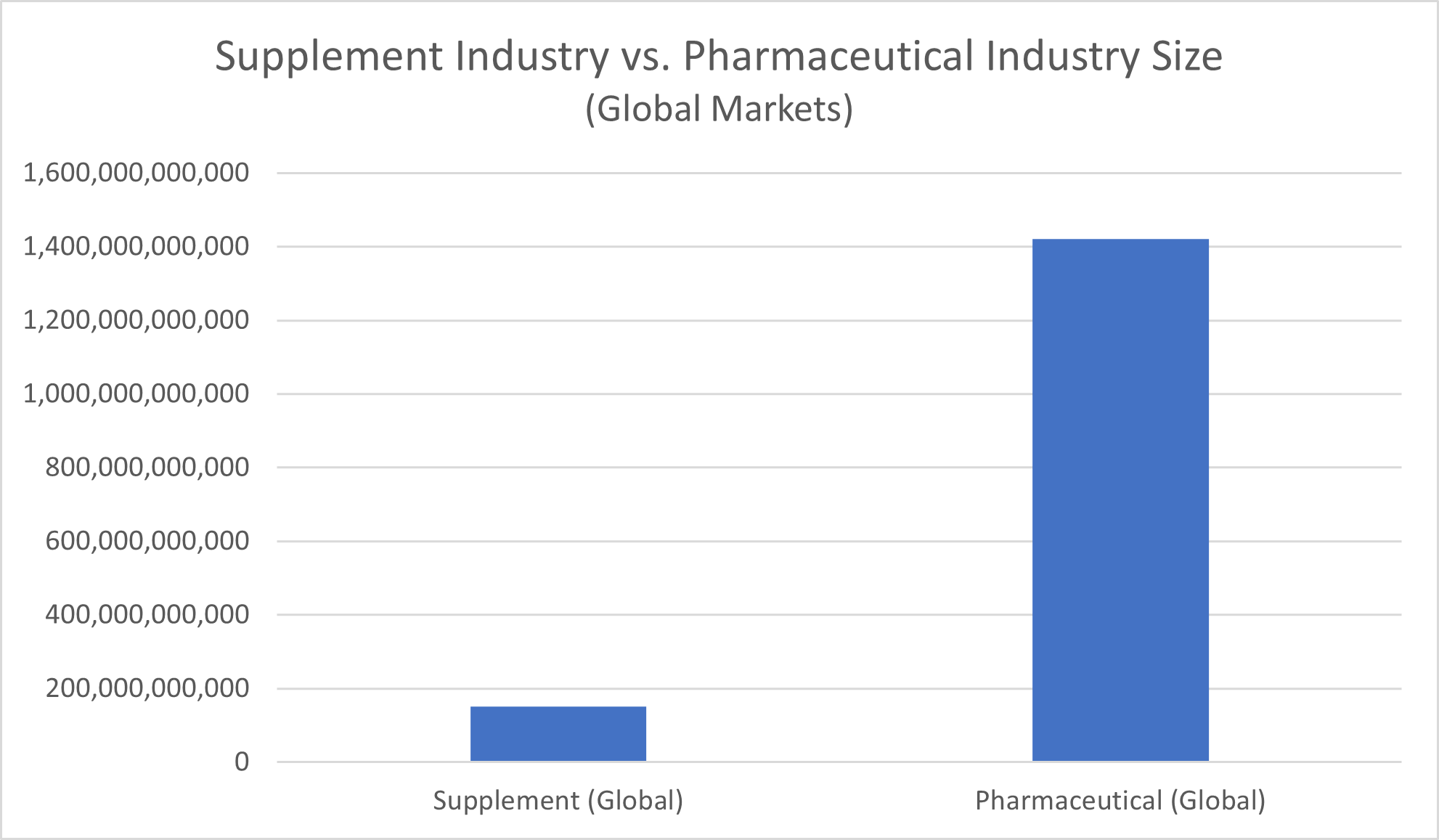
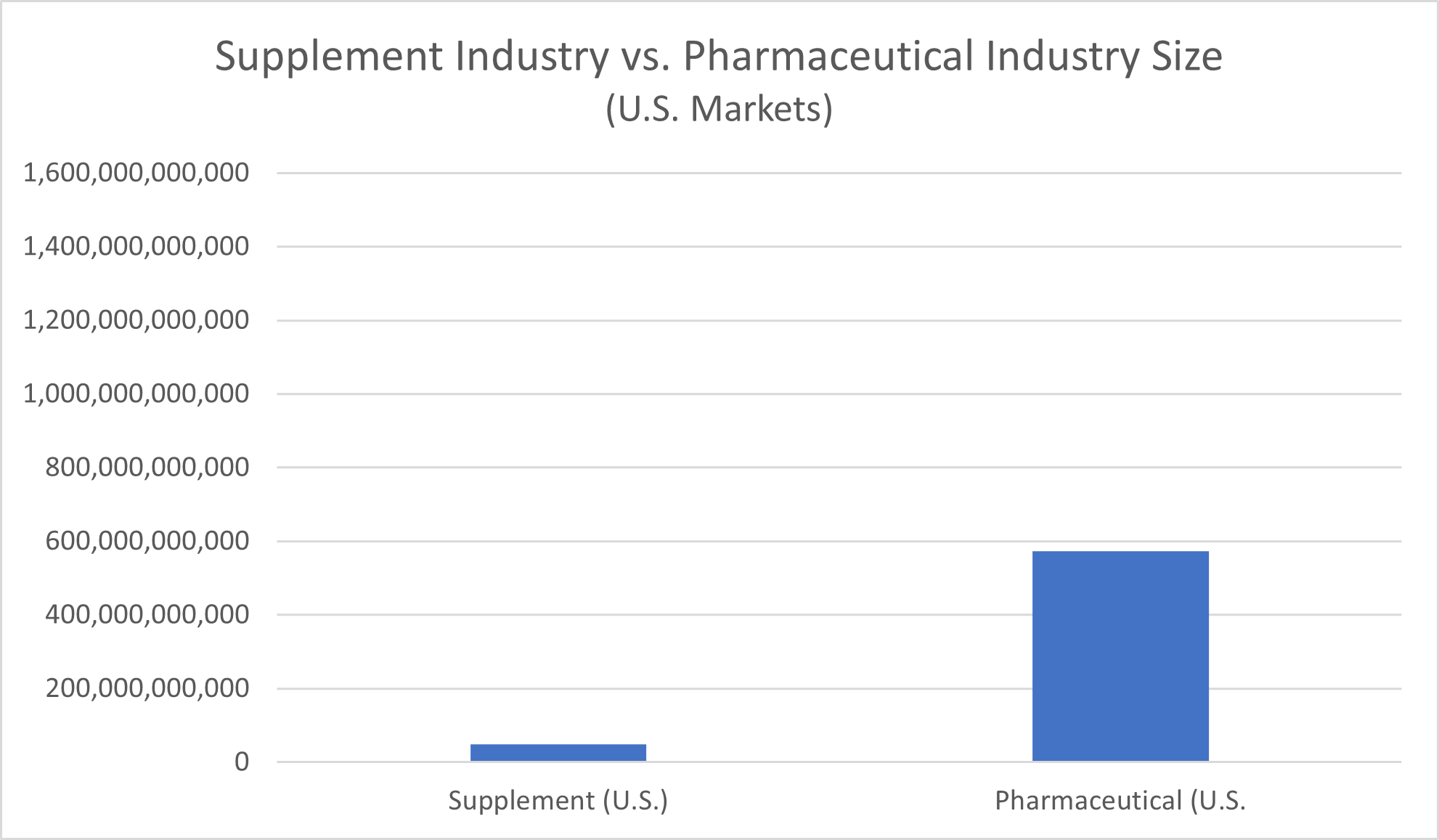
All told, the global supplement industry is just one-ninth the size of the global pharmaceutical market. In the U.S. specifically, the supplement industry is less than one-eleventh of the size of the U.S. pharmaceutical industry.
It would appear that the much larger pharmaceutical industry has nothing to worry about from the supplement industry… right?
Yet a look at the growth rates of these industries tells a different story.
For the forecast period between 2021 and 2028, Fortune Business Insights expects revenue in the U.S. pharmaceutical industry to climb by 6.3%. That’s not too shabby. By 2028, the end of the forecast period, Fortune Business Insights expects the pharmaceutical industry to reach $861.67 billion. Globally, Facts and Factors has projected a compound annual growth rate of 5.70% for the pharmaceutical market from 2022 through 2028.
Meanwhile, Grand View Research’s predictions for the supplement market—for the forecast period from 2022 through 2030—amounted to 5.6% for the U.S. supplement industry and 8.9% for the global supplement industry.
Let’s put these numbers in perspective.
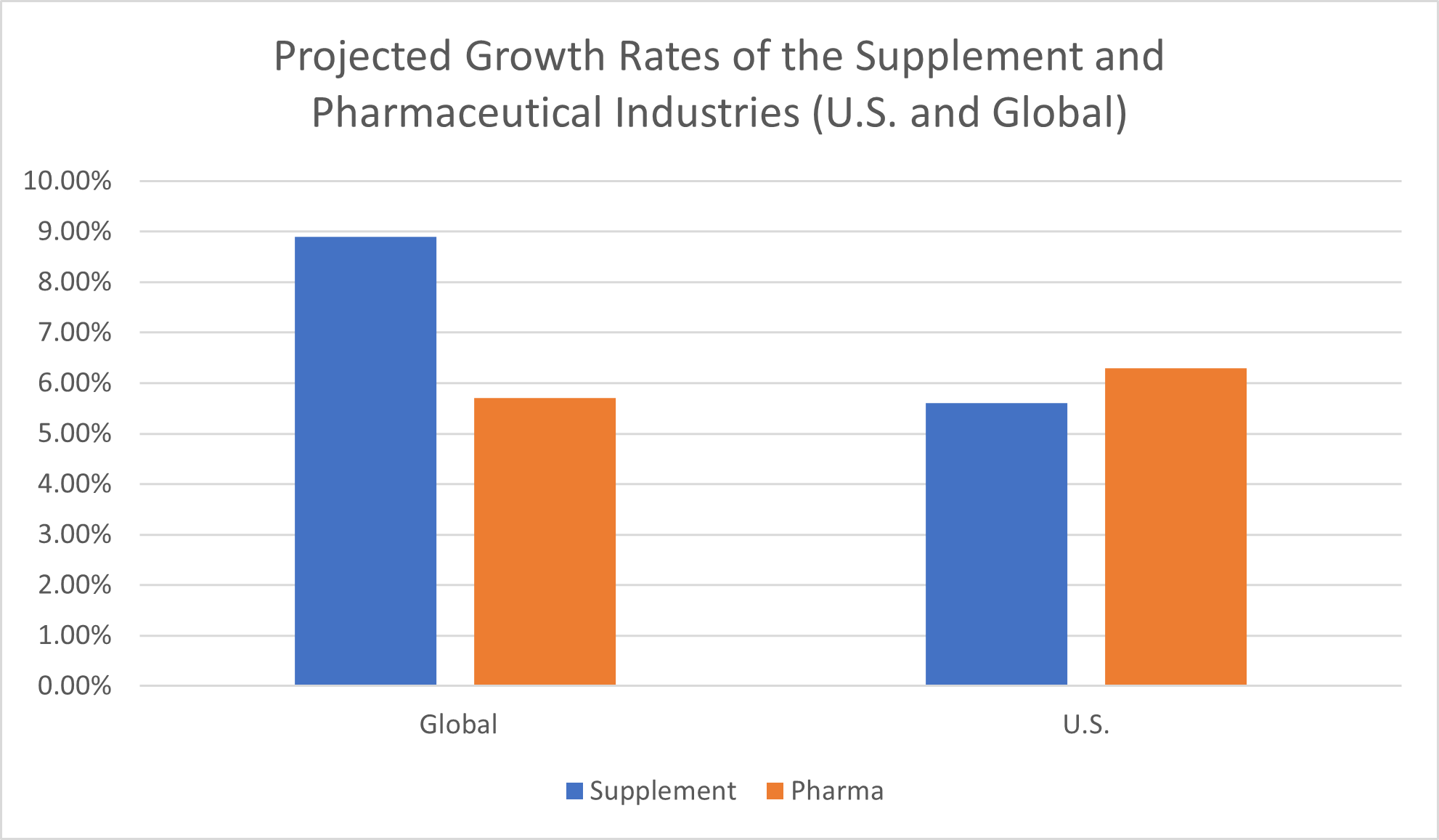
In the U.S., where Big Pharma is already the biggest pharmaceutical market in the world, growth in the revenue of the pharmaceutical industry is expected to outstrip revenue growth in the supplement industry by over 10%. Considering the long history of the pharmaceutical industry’s influence and profitability in the United States, though, that’s not as big a difference as you might expect.
Globally, though, the shoe is on the other foot. The worldwide supplement market is growing at a considerably faster rate than the worldwide pharmaceutical market. The 8.9% global supplement industry growth surpasses the 5.7% growth rate for the global pharmaceutical industry by more than 55%.
The worldwide supplement industry is growing more rapidly than the worldwide pharmaceutical industry. Even in the U.S.—where the pharmaceutical industry is as powerful as it is massive—supplement industry growth isn’t lagging by much.
To be clear, pharma industry profits aren’t facing any immediate existential threats from the competition with the supplement industry. Precisely because it is so big, Big Pharma isn’t going anywhere. Still, it’s an increasingly noticeable issue for the pharmaceutical industry that companies that sell supplements may be capturing some of the business that used to belong to big pharmaceutical firms.
Examples of Supplements That Compete With Pharmaceutical Medications
In general, dietary supplements don’t replace real medicines, especially prescription drugs. Stopping medicines that a doctor prescribed to you in favor of more natural supplements without talking to your doctor first could be unsafe. We’re not recommending doing that.
Still, there is reasonable evidence gleaned from research studies showing that certain dietary supplements can actually provide clinical benefits that are on par with those that result from taking pharmaceutical medications. Examples of these nutritional supplements include garlic, berberine, curcumin, rosemary, and red yeast rice.
Garlic Acts as an Anticoagulant and Blood Pressure-Lowering Compound
Garlic’s benefits aren’t limited to making foods more flavorful. As a dietary supplement, garlic can benefit your heart and help act as a blood thinner for those at risk of blood clots.
The compound allicin is responsible for the heart health-boosting effects of garlic, Healthline reported. Researchers described in a 2014 article published in Molecules: A Journal of Synthetic Chemistry and Natural Product Chemistry the “health-promoting properties” of allicin as being able to lower cholesterol and blood pressure and wrote, “Clearly, allicin has wide-ranging and interesting applications in medicine.”
According to Healthline, garlic supplements can reduce systolic blood pressure (the top number) by more than 8 mm Hg and diastolic blood pressure (the bottom number) by more than 7 mm Hg, on average. Average reductions in cholesterol have been reported to be as high as 10% or even 15%.
Garlic also has anti-platelet properties that make it a naturally effective blood thinner. Blood thinning medications, known as anticoagulants, are used to prevent dangerous blood clots in patients who are high-risk. Just one dose of a garlic supplement “appears to have blood-thinning potential,” nutritionist Dr. John Briffa reported in a 2002 article in The Guardian.
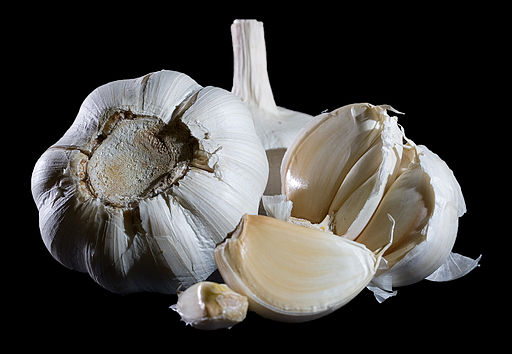
Garlic supplements have also been shown to have clinically significant effects on the during of cold symptoms and the number of colds a person develops.
The American Association for the Advancement of Science (AAAS) reported in 2017 that an active compound found in garlic called ajoene is effective in fighting chronic infections. The AAAS brief, based on a new study conducted by researchers at the University of Copenhagen, explains how this compound can weaken bacterial biofilm and inhibit the RNA molecules through which infection-causing bacteria regulate and communicate. The University of Copenhagen researchers determined that the ajoene compound was able to successfully fight two different types of bacteria that typically need two different methods of treatment.
Berberine May Compete With Metformin in the Management of Diabetes
You’ve probably heard of metformin, a pharmaceutical drug used to treat type 2 diabetes. You probably haven’t heard of the supplement berberine, however.
The plant extract berberine has been shown to lower blood sugar levels as effectively as metformin, researchers reported in an article published in Evidence-Based Complementary and Alternative Medicine in 2012. The supplement is believed to achieve this effect by decreasing the production of glucose in the liver and enhancing the body’s sensitivity to insulin, Healthline reported. Further, in research studies, berberine has shown promise in reducing blood pressure and levels of cholesterol and triglycerides, according to Healthline.
A Compound Found in Turmeric Reduces Inflammation Better Than Ibuprofen or Aspirin
A key component of the yellow spice turmeric, which has a long history of medicinal use in India, is the compound curcumin. In the body, curcumin blocks the inflammatory signaling molecule NF-kB, Healthline reported.
Blocking this signal allows the compound to combat inflammation without the side effects associated with using corticosteroids and other pharmaceuticals for the same anti-inflammatory purpose, researchers concluded in an article published in the journal Phytotherapy Research in 1999. In a 2004 study published in the cancer journal Oncogene, researchers concluded that curcumin was a more potent anti-inflammatory agent than aspirin or ibuprofen and ranked the natural dietary supplement as one of the most potent anti-inflammatory agents.
Fun fact: researchers also concluded, in an article published in Phytotherapy Research in 2014, that curcumin had antidepressant effects that were equal to those of the well-known pharmaceutical drug Prozac.
Rosemary Has Been Shown to Offer Health Benefits in Half a Dozen Applications
Serving as another reminder of why supplements are considered foods rather than drugs by the FDA is rosemary, an herb with a long history of medicinal applications.
Researchers have discovered that rosemary is rich in antioxidants, anti-inflammatory compounds and carnosic acid—which, among other functions, promotes eye health—according to Medical News Today.
The potential of this herb to impact and protect the brain is one area of research focus. Rosemary, in the form of Rosmarinus officinalis leaf hydro-alcoholic extract, has been shown to “significantly reduce” multiple markers of neurological deficits among patients who had experienced an ischemic stroke, the researchers behind a 2016 article published in the Iranian Journal of Pharmaceutical Research discovered.
Along with other herbs with medicinal properties, rosemary may help support healthy brain aging and “Alzheimer-Free Ageing,” researchers wrote in a 2015 article published in the journal Advances in Experimental Medicine and Biology. The aroma of rosemary essential oil can boost cognitive performance, researchers concluded in a 2012 article published in the journal Therapeutic Advances in Psychopharmacology.
In parts of the European Union, such as Germany, rosemary is also an approved treatment for indigestion.

One of the most interesting areas of research into rosemary’s benefits as a dietary supplement is the herb’s ability to fight cancer. For example, the researchers behind a 2007 study published in the journal Oncology Reports discovered that a type of rosemary extract had an “anti-proliferative property” that, Healthline explained, allowed it to slow the spread of two types of cancer cells (breast carcinoma and leukemia) in humans.
Fermented Red Yeast Rice Contains the Same Heart Health-Boosting Ingredient as Prescription Statin Drugs
Red yeast rice, which is a type of fermented rice, is sort of a gray area in the supplement vs. pharmaceuticals competition. This rice contains the compound monacolin K, the active ingredient through which statin drugs like lovastatin lower levels of cholesterol in the blood.
Dietary supplements aren’t regulated the same way as pharmaceutical drugs. There are no required clinical trials to prove a drug’s efficacy. This lack of regulations means that some supplements on the market may, unfortunately, do absolutely nothing.
That’s far from the case with red yeast rice.
In a 2006 article published in Chinese Medicine (the journal of the International Society for Chinese Medicine), researchers concluded that the supplement could reduce total cholesterol by an average of 34 mg/dL, triglycerides by 35 mg/dL and LDL cholesterol by 28 mg/dL.
Further, taking red yeast rice decreased the risks of subsequent heart attacks among patients with a prior history of heart attacks by 45% and the mortality rate by 33%, researchers concluded in an article published in the Chinese Journal of Cardiology (Zhonghua Xinxueguanbing Zazhi) in 2005.
The herbal supplement is so potent that the FDA regulates red yeast products with enhanced or added monacolin K or lovastatin as drugs rather than considered foods or nutritional supplements, Healthline reported.
To avoid consumer confusion, it’s important to note here that not all supplements that contain red yeast rice are equally effective. The amount of monacolin K in the supplement varies considerably across brands and products.
The red yeast rice supplements on the market that aren’t subject to FDA drug approval tend to contain only small amounts of the active ingredient. As such, these supplements offer only a small fraction of the benefits of the more highly regulated high-quality supplements that require approval as drugs.
How High-Quality Supplements Can Affect the Prescription Drugs You’re Taking
Because there’s reasonable evidence indicating that some dietary and herbal supplements may have clinical effects comparable to pharmaceutical drugs, it’s also possible for supplements to interact with drugs.
The AARP (American Association of Retired Persons) doesn’t mince words in its warning that combining certain supplements with prescription drugs and over-the-counter drugs “can have dangerous and even life-threatening effects.”
These risks can occur when the supplement enhances the effect of the prescription drug too much. Negating or diminishing the drug’s effects may also be problematic because the patient isn’t getting the full clinical benefits their doctor believes they need. Interactions between supplements and pharmaceutical products matter, and they can be “unpredictable” at times, the AARP reported.
Patients who are taking blood-thinning medications have to be careful taking garlic supplements. Garlic supplements can interact with anticoagulant medications and cause the blood to become too thin, increasing the risk of bleeding, the National Center for Complementary and Integrative Health reported.
Rosemary, too, can interact with prescription blood thinners. Other potential interactions between rosemary supplements and pharmaceutical medications include interactions with ACE inhibitors used to treat high blood pressure, lithium used to treat manic depression, and diuretics which increase urination.
Not all interactions between supplements and existing drugs are negative or unfavorable. In many cases, supplements serve a purpose in complementary medicine. Rather than replacing prescription or over-the-counter drugs, they are used in addition to these pharmaceuticals to support wellness.
For example, while garlic supplements could pose risks if taken along with pharmaceutical anticoagulants, they may complement other pharmaceutical interventions. In combatting chronic infections, garlic supplements have been shown to work even more effectively when paired with antibiotics, the American Association for the Advancement of Science reported.
Another combination researchers have identified as promising is garlic and fluorine. The Science X Network reported in 2017 that modifying garlic compounds to include the widely used element fluorine resulted in compounds that “were superior in biological activity.” Specifically, garlic fluorination may have applications in cancer drug therapies as well as the treatment of blood clots.
Public Perception of the Pharmaceutical and Supplement Industries
Can pharmaceutical companies be trusted? If you’re like the majority of Americans, you’re skeptical of the Big Pharma corporations that push pills and profit from patients’ sickness rather than from promoting wellness.
Such companies don’t have a favorable image among consumers and the general public, especially when they jack up the prices of existing drugs and are caught using regulatory loopholes to avoid the loss of exclusivity that could bring down their total profits.
According to survey results published by the Council for Responsible Nutrition in 2022, 77% of the general population and 84% of supplement users viewed the supplement industry as “trustworthy.” In contrast, a Gallup, Inc. poll on Americans’ Views of U.S. Business and Industry Sectors conducted in 2022 established that only 25% of Americans expressed positive views of the pharmaceutical industry. Gallup, Inc. found that 58% of respondents held actively negative perceptions of the pharma industry.
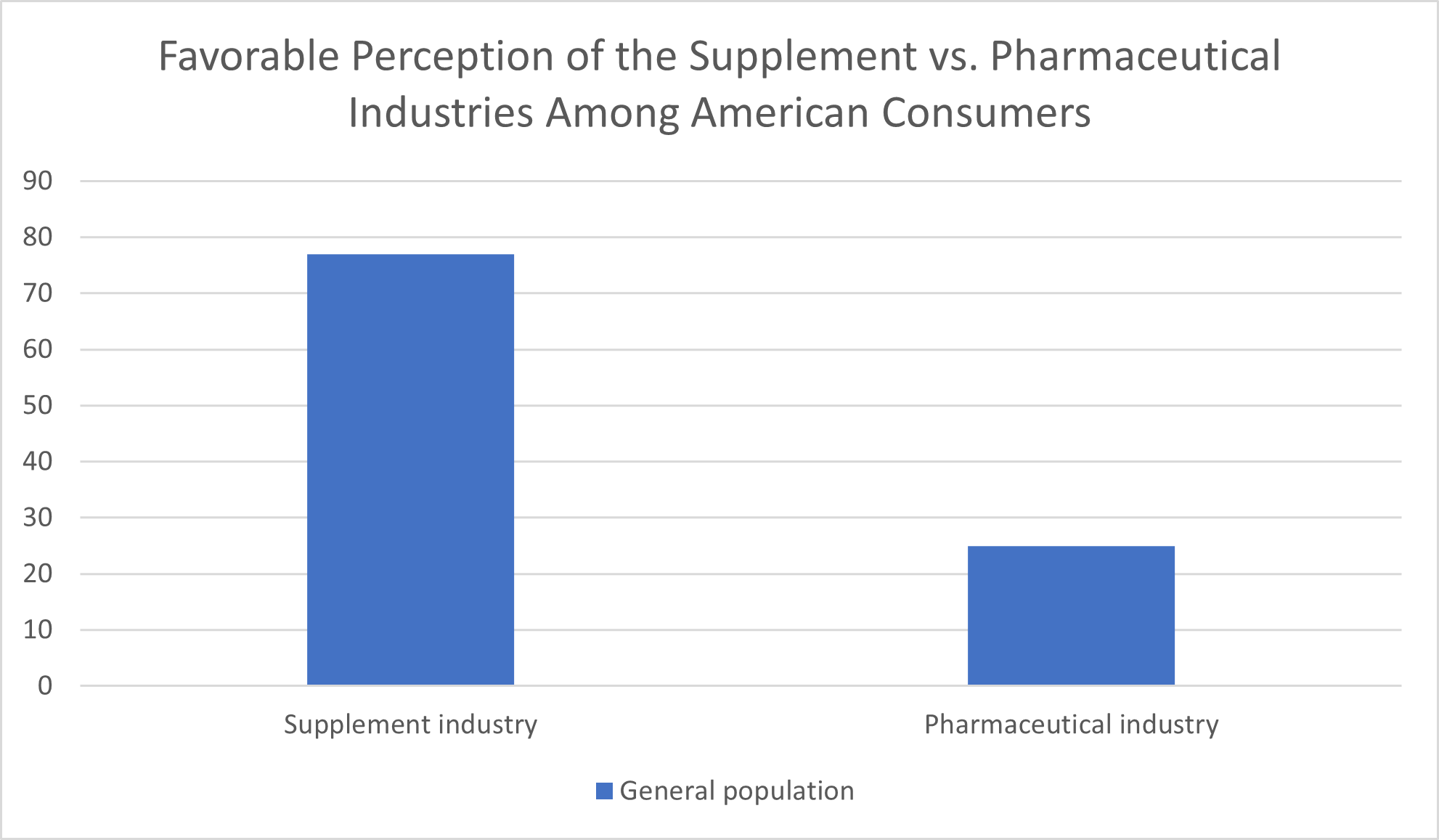
Certainly, part of the supplement industry’s gain over product categories formerly dominated by Big Pharma is due to these industries’ reputation with consumers. These massive differences in perception might not matter so much if the pharmaceutical industry and the supplement industry aren’t in direct competition. If consumers aren’t choosing between pharmaceutical products and supplements, their distrust of pharmaceutical companies isn’t likely to affect these companies’ bottom lines in a significant way.
Yet, in some instances, it’s possible patients are doing exactly that: choosing supplements over drugs.
If your doctor identifies a health need that either a supplement or a pharmaceutical drug could meet—most commonly, to address more mild conditions or symptoms—which would you choose: the vitamins and herbal supplements labeled “natural,” or a drug whose ingredients you find it hard to even pronounce, much less understand what they entail, that was cooked up in gigantic chemical labs?
Generally speaking, pharmaceutical drugs are more extensively studied than supplements. Thanks to the clinical trials drug companies must put their products through, you’re unlikely to find that a pharmaceutical medication does absolutely nothing, as you may find with some supplements on the market.
Yet pharmaceutical drugs are also more expensive. They tend to have more highly publicized risks of side effects. From the consumer perspective, at least, drugs are farther removed from their “natural” ingredient sources than dietary supplements.
Why Is the Supplement Industry So Successful?
We can attribute the supplement industry’s success to a combination of factors.
An Increased Focus on Health, Wellness, and Fitness
The growth of the health and wellness community and the increased focus on wellness among consumers more generally have given rise to a greater demand for vitamins, herbal extracts, and other natural supplements.
Despite the emphasis on eating a healthy diet, hectic work schedules and busy lives make it difficult for many people to get all the nutrients they need from diet alone. Buying high-quality supplements, in combination with eating a healthy diet, can help consumers consume the optimal doses of nutrients that support wellness.
The Benefits of Being Regulated as Supplements Rather Than Drugs
Remember, despite their potential in the medical realm, supplements aren’t considered medicines, and they aren’t regulated as such, either. Under the Dietary Supplement Health and Education Act of 1994 (DSHEA), vitamins, herbs, and other dietary supplements are classified under the category of food by the FDA.
There are benefits of this classification. Being subject to comparatively little regulation means your favorite supplement brands don’t have to pay to undertake expensive clinical trials. Highly trusted supplement brands spend far less time and money on drug development and can avoid the lengthy process of securing FDA drug approval through numerous phases of testing.
It can take 10 to 15 years for drug companies to get a new drug to the market. Meanwhile, a trusted supplement brand can essentially begin earning profits as soon as the supplement company’s manufacturing process can produce a product to distribute to eager consumers in the wellness community. Even if such companies are introducing new dietary supplements to the market, they need only “notify”—not get approval from—the FDA a few months in advance.
Comparisons With the Pharmaceutical Industry
It isn’t only what your favorite supplement brands are doing right that makes them successful, but also what the pharma industry is doing wrong.
These big companies that push pills have, in some highly publicized cases, failed to lower prices of drugs that are critically important and, in many instances, aren’t even new innovations. The mega-companies in the pharmaceutical industry have historically claimed that the high costs of drug development necessitate these exorbitant prices. However, the international nonprofit organization Médecins Sans Frontières (MSF), also known as Doctors without Borders, refutes this claim, alleging that the real costs of drug development are only a (comparatively) small fraction of what drug companies say they are.
Pharma companies and Big Pharma as an industry are sometimes their own worst enemies. Choices they make, like eschewing smart long-term investments for cheaper short-term solutions and failing to streamline matters of regulatory compliance, cost pharma companies more in the long run. High-quality supplement brands can—and should—learn from the ways the pharmaceutical companies need to improve.
How Are Pharmaceutical Companies Addressing the Impact of Popular Supplements on Their Business?
The triumphs of the leading, high-quality supplement brands could translate to pharma industry competition. How are such companies coping with this increasingly noticeable issue that could chip away at the industry’s total sales?
Big Pharma’s involvement—in the vein of “if you can’t beat them, join them”—might not surprise those who distrust the pharmaceutical industry. In recent years, Big Pharmaceutical Firms are buying up the small firms—and even the larger companies—that sell dietary supplements.
Naturally, these business moves are drawing media attention.
“Big pharma is buying your favorite supplement brands,” health optimization and longevity center Next Health asserted.
Pharma companies are gobbling up nutrition and supplement companies in a frenzy of mergers and acquisitions, Medium reported.
What this means is that many of your favorite supplement brands are no longer the small companies that carefully craft the herbal supplements labeled as “natural.” Rather, the makers behind many nutritional supplements are big companies—some of which are owned by drug developers. Instead of Big Pharma, it’s Big Herba.
In supplement companies run by Big Herba (and Big Pharma behind the curtain), the supplement company’s manufacturing process is overseen by—and likely subject to similar procedures as—the gigantic chemical labs used in the pharmaceutical arms of the parent company. If anything, the quality control standards that apply to Big Herba are likely even lower, given the minimal regulations for supplement companies established by the Dietary Supplement Health and Education Act.
The products produced by your favorite supplement brands aren’t subject to the same rules and regulations, in terms of proving efficacy and safety through clinical trials, that pharmaceutical products are. The parent companies that now aim to sell supplements, in addition to using regulatory loopholes and patent protection, to boost their total sales and make more money certainly know they can get away with cutting corners in this industry that involves little regulation.
Big Pharma’s involvement in the supplement industry can make buying high-quality supplements—even from highly trusted supplement brands—a lot harder for the consumer.
In many cases, the names on the bottles of your favorite supplement brands provide only minimal information about who is really producing your dietary supplements. The consumer confusion that results from Big Pharma’s involvement in the dietary supplements industry is such that even the most conscientious members of the health and wellness community know little about the companies behind their favorite supplement brands—and it isn’t only pharmaceutical companies that are jumping on the bandwagon of purchasing supplement companies.
For example, the Carlyle Group is an example of the mega-companies that have bought an assortment of high-quality supplement brands. This company owned, among other assets, the NBTY supplement brands: Vitamin World, Nature’s Bounty, Puritan’s Pride, and Sundown Naturals. Numerous acquisitions eventually left some of your favorite supplement brands the property of another large company, Nestle.
Other trusted supplement brand names ended up being sold off individually. Vitamin World, for example, was sold to Center Lane Partners in 2016 and is no longer part of the Nature’s Bounty family of brands.
A financial incentive makes the Big Pharma companies that are behind many of the Big Herba companies unlikely to publicize their involvement in these once highly trusted supplement brands. “The industry’s little-guy, granola image has been a great marketing asset, allowing it to tap into Americans’ frustration with big medicine, big prices and big risks,” NBC News reported. By downplaying—or at least not advertising—their involvement in the industry, Big Pharma companies can earn more money by profiting from both sales of pharmaceuticals in the medical realm and sales of supplements in the health and wellness community.
The Future of Competition and Collaboration Between Big Pharma and Big Herba
Where will the growth of Big Herba, Big Pharma’s involvement in the supplement industry, and the increase in reasonable evidence of supplements’ clinical effects lead?
The more extensive and more compelling the evidence of the clinical benefits of dietary supplements becomes, the more widespread the use of these individual supplements is likely to be. This increased use of such supplements could erode the profits of the pharmaceutical industry to some degree. However, it’s unlikely that this shift will be sufficient to take down major pharmaceutical companies.
The pharmaceutical industry remains large and is only growing larger. It may not be the most profitable industry out there, but Big Pharma remains profitable despite the costs of drug development and regulatory compliance. It would take a truly drastic shakeup for the supplement industry to overthrow the influential pharmaceutical industry from its long-entrenched position in the global and United States economies and put an end to Big Pharma as we know it.
More likely are new and alternative treatments that incorporate the benefits of dietary supplements. As more data comes to light about the clinical benefits of supplements, these nutrient-rich ingredients may offer new options for patients for whom traditional medications are contraindicated or cause troublesome side effects—or for those who simply prefer to try more natural alternatives first.
Another likely possibility is the further development of new drugs, new treatments, and more comprehensive care plans that combine the benefits of traditional pharmaceutical medications with those of the most extensively studied dietary supplements. Adding fluorine to garlic with the aim of blocking the growth of cancerous tumors is just one example of the countless potential applications of integrating natural ingredients and pharmaceutical medications. Who can say what innovations might be achievable through collaborations between pharmaceutical companies and supplement companies?
